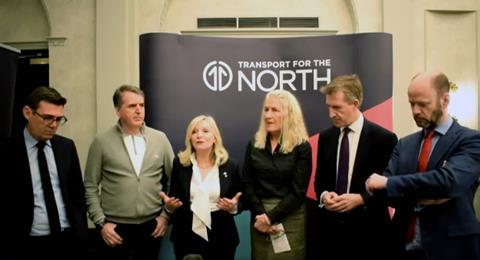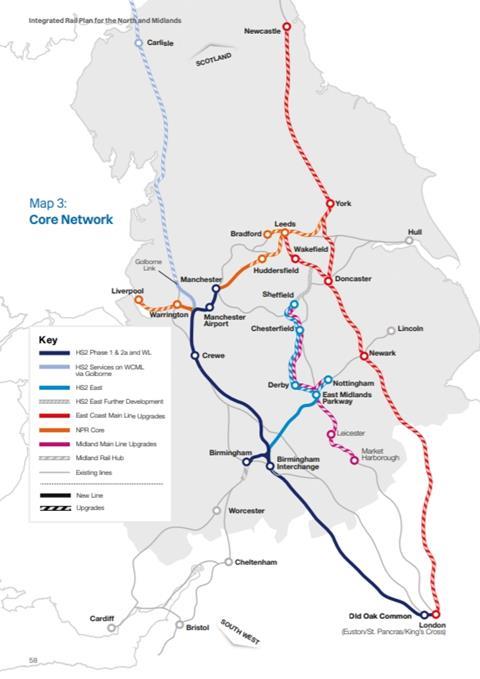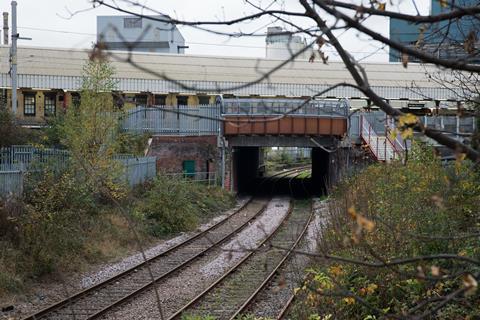
UK: Political leaders from across northern England have written to the Secretary of State for Transport seeking a way forward following the publication of the Integrated Rail Plan, which they said was ‘the wrong solution for the whole of the north and does not deliver the long-term transformation required to level up the north’s economy’.
The Transport for the North board said the government’s proposals breached previous commitments on Northern Powerhouse Rail, and differ from the board’s preferred options as set out in its statutory advice to the Department for Transport.
The board now wants to work with the government to explore ways in which its preferred Northern Powerhouse Rail network might still be realised, and has requested that the Secretary of State meets with a delegation including TfN Interim Chair Cllr Louise Gittins as soon as possible.
‘The north has spoken with one voice to make it clear that the government’s Integrated Rail Plan in its current form is not acceptable’, said Gittins. ‘That is why our statutory advice to government is clear that they must think again. Instead of this top-down centralised approach they need to reach out and work with local communities, and businesses.

‘Despite our deep concerns that IRP is woefully inadequate, the TfN board unanimously agreed that it wishes to explore with government funding options for the delivery of the preferred NPR: options could include local contributions, including through harnessing local economic benefits.
‘We still believe that there is a way forward that will enable them to collaboratively move at pace to prioritise and sequence investment in a way that delivers the early foundations of a modernised rail system for the region. Instead of what looks like years of rail delays to build a network that by the time it’s finished will not be fit for purpose.’
Noting that the plan fails to deal with capacity constraints, particularly around Leeds and Manchester, the board has called on DfT to publish the technical work underpinning IRP as a matter of urgency; press reports have suggested that some decisions, such as dropping the Eastern Leg of High Speed 2 to Leeds, were taken before formal analysis of value for money and the impact on the rest of the project had been completed.
Confusion
On November 24, the metro Mayors of Liverpool, Manchester, West Yorkshire, South Yorkshire and North Tyne Combined Authorities stood together to announce a set of principles which they would take to the government.
The leaders expressed confusion over the DfT’s announcement that TfN would be moved to ‘co-sponsoring client’ for projects, with Gittins noting ‘we still provide statutory advice to the government, and it’s clear that that’s not going to change.’
Clearly angered, Liverpool Metro Mayor Steve Rotheram attacked recent comments by the Prime Minister with the blunt statement ‘I’ll simplify for the Prime Minister. This is not about vroom vrooms, this is about choo choo trains, and the more people we get out of cars and into well-funded and well connected public transport then the better it’ll be for the environment.’
The attack was taken up by West Yorkshire Metro Mayor Tracy Brabin who reflected on the decision not to construct the section of NPR via Bradford to Leeds, noting that the Prime Minister had previously given a clear commitment to that section of the project.
‘You can’t leave out Bradford, the youngest city, the least connected city, and then expect it to flourish and to level up with the rest of the country’, she said.
Land value capture
The leaders suggested a more extensive programme of work could be funded by land value capture, taking part of the ‘wealth’ generated by improvements to the transport infrastructure rather than it going ‘as a windfall to speculators’.
They were confident that the £25bn gap between the cost of the full NPR line and the funding announced by DfT for its partial construction could be found in this way.

Mayor of Greater Manchester Andy Burnham said ‘we’ve never had devolved entities that have been able set up to capture this land value uplift, but if you look at it now, we have combined authorities neighbouring across this corridor from the Liverpool City region through Greater Manchester now to West Yorkshire and South Yorkshire. You’ve got contiguous combined authorities that, if we work together and the government gave us legislation to work together, we could we could capture the value of the new line.’
He felt that ‘the government just sits there and says to different parts of country “we’re going to give you this and that’s all you’re going to get, and that’s it”. We’re calling for a new approach; sit down around the table with us. Consider how you can unlock the local contribution to get the right solution for the north of England.



